Growing up, Kathy* never knew missionaries. Moreover, ‘normal’ Christians didn’t become missionaries, she thought, because servants like that were “a different class of people,” Kathy said. Like those who chose missionary work had some sort of secret superpower.
However, Kathy and her husband Bill* now know God invites normal people into eternal achievements. They arrived in Senegal in 2008 as global workers.
She grew up going to church, thanks to a Christian family. Still, she never once met a missionary.
“We heard about missionaries all the time, but they were never anybody we knew,” Kathy said of her childhood church experiences. “No normal person would be a missionary.
“I was even on the missions committee as a teenager. I never in a million years thought it would be something I would do. No one ever said, ‘Do you want to be a missionary?’”
Related: Building a missions culture
What about Bill?
Therein lies an irony about Bill: he is normal. And he is a global worker married to Kathy.
Bill committed his life to cross-cultural ministry in 1987. A Navigators’ retreat speaker told college students that most missionaries weren’t going to unreached peoples.
“That [fact] really struck me very hard,” Bill said. “I made a commitment there to serve cross-culturally among unreached people in the future.”
Related: Knowing God’s heart
Bill was ready to be a missionary but still didn’t know when. So, after college, he worked as an electrical engineer for IBM in Kingston, New York.
Thirteen hours of asphalt interstate beside the rolling, scenic Appalachian Mountains connect Bill’s hometown in Tennessee to Kathy’s hometown in New York. They met in Kingston and dated, navigating together if they would someday do global work.
They were so convicted to go abroad that their wedding vows mentioned their international service to God. A friend at their wedding responded with tears, thinking she’d never see Kathy again.
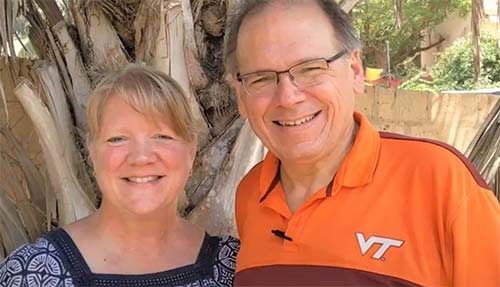
In fact, they didn’t deploy for 18 years.
Like many ‘normal’ Christians, the couple focused on raising a family and paying off college debt. They believed seminary was vital, yet the cost and geographic relocation never made sense.
God makes a path in his time
Next, Bill switched jobs to a Rochester, New York, company. That move blessed their faith so much because their new pastor, Jim Panaggio, was so passionate about missions.
“This pastor was on fire,” Bill said. “He was all about missions. This guy was an important person in our life because he encouraged us. He relit the fire a little bit.”
After a few years, Bill went to work in Boston. He enrolled in night classes at nearby Gordon-Conwell Seminary from 1997 to 2005.
Then, the family spent a summer in Zimbabwe. Gordon-Conwell required such a trip for missions students. Plus it gave the family with young children a chance to serve abroad together.
“We could do it,” Kathy said of missions. “It was physically possible. You can live and be a family. It is possible.”
Related: What missionaries desire most
In 2005, the couple attended Converge’s Missionary Discovery & Assessment. The desire had been in their hearts. Completing seminary meant the timing for international service had arrived.
However, a destination had not. But, on the last day of assessment, someone handed the couple “reams of information” about the Wolof people. They were assigned to create a theoretical, 10-year-strategy to reach the Wolof.
A deeply researched theory prompts a divine realization
“Why did you pick this people group?” Bill asked the assessors.
The answer wasn’t sophisticated. The Wolof were the largest unreached people group in Senegal.
Plus, Bruce and Julie* unexpectedly moved to Senegal shortly before the Bill and Kathy were assessed. Bruce and Julie knew little about the Senegalese but saw potential for a work of God. So, theoretically, the homework assignment might apply to a real-world situation.
Related: A chance for God to grab their heart
However, Bill was a little stunned as he studied the people group. A discipleship strategy built around one-on-one relationships, a joy and strength of Bill’s, was the wisest course.
“They are the kind of people I envisioned going to,” Bill realized during the strategic planning.
So, he and Kathy learned French, raised support and moved to Senegal’s capital city, Dakar, in August 2008. Bruce and Julie were incredible teammates since they were more experienced in global work.
“They were knowledgeable about culture and how to shop at the grocery store or get vegetables at the market,” Kathy said. “They were wonderful people to help us get used to the country.”
God had a global plan for Kathy, even if missions didn’t seem for her
Before they moved abroad, Kathy worked as an illustrator, designing book covers in New York City. Once in Senegal, a ministry developed for Kathy through teaching art at Dakar Academy. The woman who never thought she’d be a global worker started teaching at the international school in 2012.
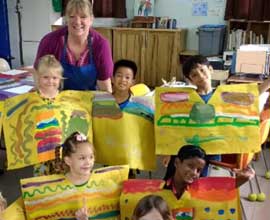
“I always thought it was a sweet God-thing that I got to use my passions and giftings on the mission field,” Kathy said. “That was certainly never part of the plan. I never thought I’d teach art when we moved overseas. But here was this school that needed an art teacher.”
Related: ‘I had never heard any of this’
In addition, she and Julie helped Muslim boys learn to read or speak French. They tutored the boys at an assistance center in Senegal for children living on the streets. The academic skills gave the boys better chances later in life.
Whether engineering or English, Bill loves people
Bill’s role started with teaching English as a foreign language in Dakar. He realized there wasn’t much outreach happening on the college campus. But there were 8000 students from many nations who majored in English. So, he wanted to find a way to build relationships with the students and share Christ.
Bill’s motivated heart doesn’t surprise Ron Gray at all.
Gray met Bill, a fellow college student, one semester at Virginia Tech. Gray knocked on Bill’s door. He wanted to know if he could ask Bill a few spiritual questions.
Bill expected demographic questions about his denomination or recent church attendance. Instead, Gray asked, “Who do you think Jesus Christ is?”
Related: ‘What if I offend them?’
Bill admits the question bowled him over and didn’t know what to say. Still, he started going to a Bible study with Gray. After attending for several months, Bill had become a Christ-follower.
“Bill was always a very others-centered person,” Gray said. “Bill loves the Lord, and he loves people. I don’t think you can pay a higher compliment to somebody than that.”
Three years after accepting Christ, Bill traveled to that 1987 college retreat where he submitted to serve God among least-reached peoples.
Why are the Senegalese a least-reached people group?
There are about 30 tribes or ethnic groups in Senegal and 16 million people. Ninety-five percent of the country are Muslim; five percent are Roman Catholic.
Whether Muslim or Catholic, the Senegalese are animists first, Bill said. They mix their traditional African spiritual views into folk Islam or folk Catholicism. Bill said that people turn to black magic when they are trying to curse someone, have a baby or do well on an exam.
Bill became Converge’s Metro Dakar initiative leader in 2019. That mission expanded in 2021 to become the Metro SenWest Initiative. Now, the Converge team focuses on making disciples among the least-reached people within a triangle created by three cities: Dakar, Thies and Mbour.

“The area in the middle of that triangle is growing like crazy,” Bill said. “Lots and lots of people from all over the country and other countries are moving into this urban triangle.”
Related: ‘Do you recognize me?’
That geographic and cultural shift in ministry creates a new possibility for spiritual fruit among the traffic and low-rise buildings. Throughout the triangle, cars, scooters, motorcycles and horse-drawn carts create a noisy, smelly hustle on dirt and paved roads.
“A lot of people here are struggling to survive,” Bill said. “Anywhere they can get help, they’re happy to get it.”
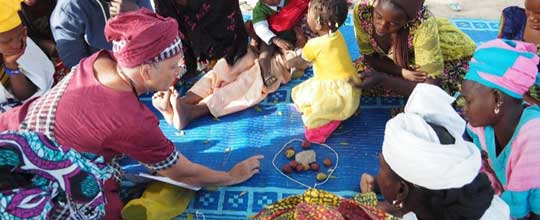
Prayer is parallel to projects
The Metro SenWest Initiative incorporated seven ministry projects with one goal: to make disciples who make disciples. Hopefully, that goal will lead to 5% of the Senegalese becoming disciples who fruitfully share the faith.
“There’s a specific goal we’re pulling toward,” Bill said. “That’s something we didn’t have before. That vision from Converge provides a good goal for us to be aiming toward.”
The three projects in Dakar are Dakar Academy, English teaching as outreach and assisting a small national Senegalese church in a Dakar suburb.
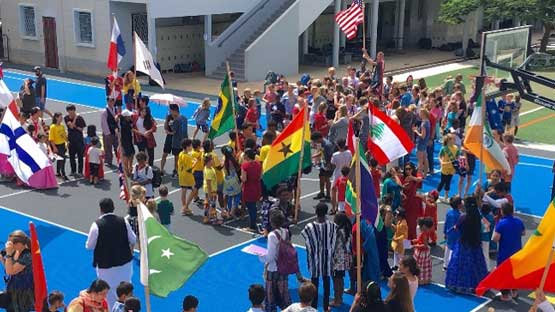
In Thies, there are four projects.
First, the team trains others to make disciples. Brad and Deb live there, working with a Senegalese believer who is an evangelist. Brad also builds relationships to share the Bible, especially the Old Testament, which is more accessible to Muslims.
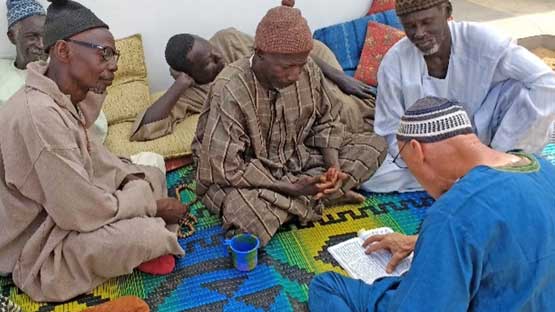
A second Thies effort is vocational training, so Christians become teachers who reach out through their work. Third, the Converge initiative engaged in media development in the Wolof language, such as Christian radio programs and social media about the Bible.
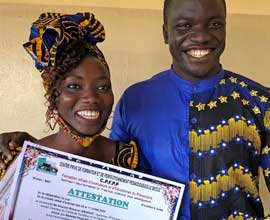
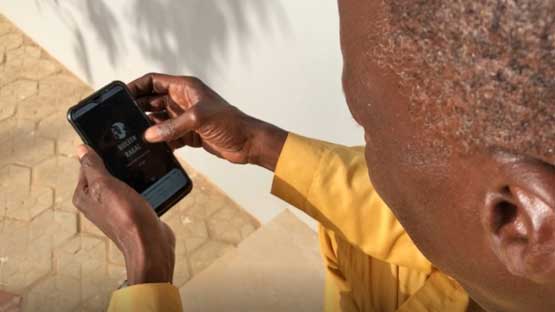
Finally, a Senegalese man who is a part-time chaplain in Thies hospitals follows up with discharged patients.
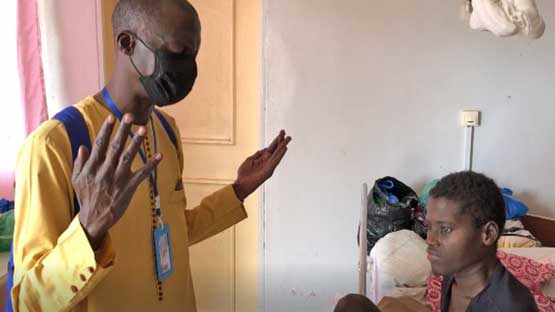
The team in Senegal is eager for help, especially from interns. But Bill and Kathy also recognize the power of ‘normal’ Christians doing the eternal work of the gospel.
“We really want to get some young people in here so the ministry can continue after we’re gone,” Kathy said. “We’ll be here for several years, but we can’t stay forever.”
The heart behind all seven projects is the same: a desire for God to do what he hasn’t yet done in Senegal.
“We’re asking God for a breakthrough,” Kathy said.
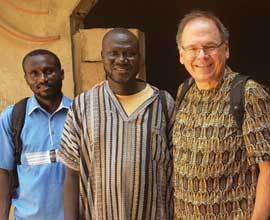
*For security purposes, full names are not disclosed.
Converge is asking God for a gospel movement among every least-reached people group – in our generation. Learn how we are playing a role in accomplishing the Great Commission and how you can be involved.